This interview originally appeared in the April 1994 issue of SPIN.
I’ve been coming up with lots of theories lately, for no special reason except maybe to kill time between episodes of the Larry Sanders Show. Here’s one: When I first heard Pavement‘s new album Crooked Rain, Crooked Rain, I was convinced it was secretly an answer record to R.E. M.’s Reckoning (“Range Life” was “(Don’t Go Back To) Rockville,” “Cut Your Hair” was “Pretty Persuasion,” umm. . .). This isn’t as stupid an idea as you might think: Pavement contributed a song to the recent AIDS-benefit compilation No Alternative called “Unseen Power of the Picket Fence,” a paean to the Athens, Georgia, combo, and specifically to Reckoning (from which we learn that “Time After Time (annElise)” was singer-guitarist Stephen Malkmus’s “least favorite song”). My theory, of course, falls apart under any kind of analysis, but I did wonder if the band had received any feedback from the R.E.M. camp.
So when I got together recently with the five band members—an unreasonably good-looking bunch of fellows, right up there with those guys in Helmet—naturally the subject came up.
“Supposedly Michael Stipe called someone up and asked if we were ‘taking the piss,’ ” says bass player Mark Ibold.
“Then I heard that when he understood that it was actually complimentary,” continues second drummer Bob Nastanovich, “he wanted to dance onstage if we were gonna play the MTV No Alternative show. That nixed any possibility of THAT ever happening.”
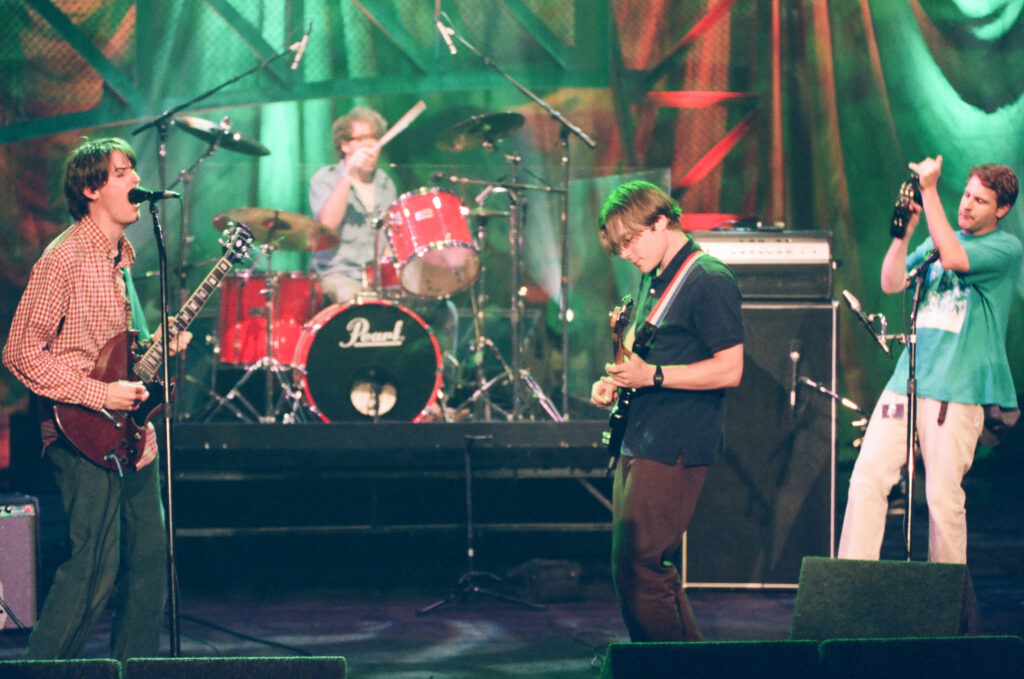
“We tried to make a nice record,” stresses Malkmus, off-handedly deflating the hard-held critical notion that his band is a sort of safe-house for unrepentant ironicists. His pronouncement on Crooked Rain, Crooked Rain, the group’s second LP, is met by low growls of intraband dissent, but Malkmus will not be turned.
“It’s uplifting to me in a fun sense. There’s some unabashedly pop stuff on this record. I try to sing it in a way … there is some distance, I mean … I hope the listener knows that we know that for us, this is really poppy. It doesn’t mean that we hate Jesus Lizard or something ”
Malkmus is Pavement’s principal songwriter, but for some reason it’s difficult to peg him as the band’s frontman, maybe because traditional rock band terms all seem to sprout quotation marks when applied to Pavement. Despite Malkmus’s straightforward, regular-guy demeanor, his songwriting begs descriptions like “elliptical,” and the ambiguity of the band’s circumstances has lent an aura of mystery to Pavement which the band has never taken great pains to dispel.
Calling Pavement a “band” at all presents problems, because most of the records have been the product of mainly erstwhile-Californian Malkmus (identified as “S.M.” on most Pavement records) and pal Scott Kannberg (“Spiral Stairs”), fleshed out live by a coterie of buddies whose roles have always seemed ill-defined. Finding all five members in one city when the band is not on tour is extremely rare; usually, Kannberg can be found somewhere in northern California (he recently moved to San Francisco from Sacramento), Nastanovich in Louisville, Kentucky, new drummer Stephen West in Brooklyn, and Ibold in Manhattan. Malkmus, who’s staying with West for now, doesn’t even really have a home.
“I see Steve, like, once every two weeks here,” says Ibold. “If that.”
“But I’m always calling someone, or. . .” continues Malkmus.
“I wish I did see him more, though,” interjects Ibold suddenly.
“Thanks,” replies Malkmus, somewhat taken aback. “That’s nice.”
“I don’t know, you’re only across the river,” says Ibold “Why don’t I see you more?”
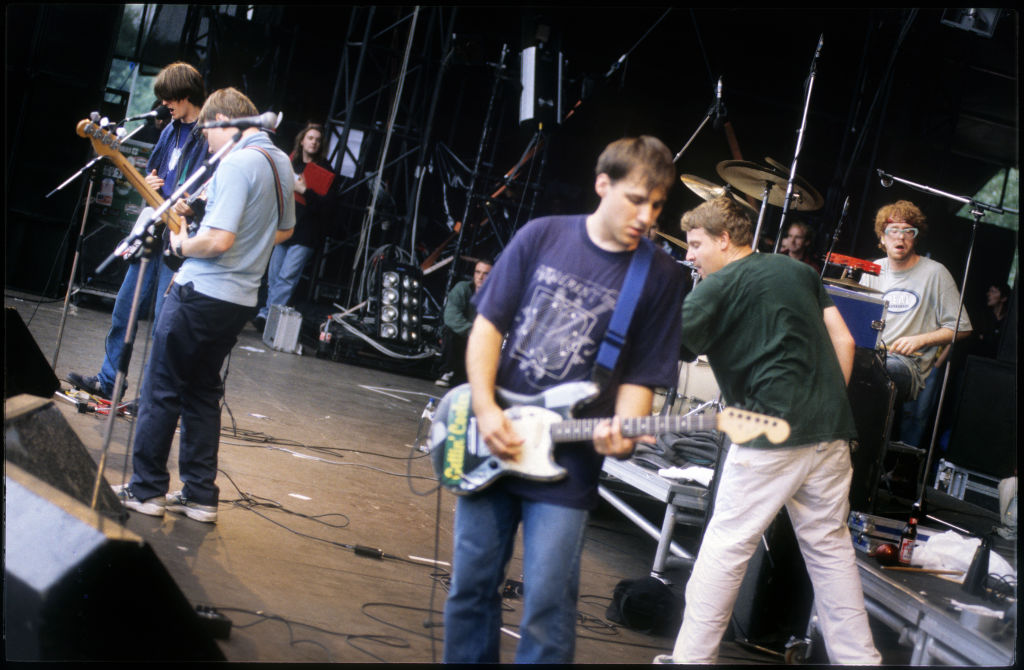
From the beginning: “Scott and I probably first knew each other when I was ten,” says Malkmus, but Pavement didn’t begin until 1989, in Stockton, California, just after pale, rail-thin Malkmus returned from the University of Virginia and got drunk one night in his parents’ living room with pale, square-shouldered pal Kannberg, wrote a few songs, and decided to release a single (they called their label Treble Kicker). The off-handedly assembled result, Slay Tracks: (1933-1969), featuring fellow Stocktonite Gary Young on drums, received low-key raves from the indie-rock community. Slay Tracks contained in seed form the peculiar pastiche of noise, jittery melody, and mostly knotty lyrics that would blossom on later records.
Soon thereafter Pavement recorded another single, called Demolition Plot J-7, which was released by an obscure Chicago label called Drag City, and followed that up with a ten-inch EP, Perfect Sound Forever, also on Drag City. The EP fulfilled the promise of its audacious title: more cohesive than anything the band had previously accomplished, songs like “Debris Slide” and “From Now On” bordered on the anthemic and hinted at glories to come. By now it was 1991, and the critical murmur had slowly grown to something resembling a groundswell of near-universal admiration. Anticipation, too, as badly duped copies of what would be the band’s first LP, Slanted and Enchanted, began to circulate among rock critics and lucky fans.
At this point, more people had heard of Pavement than had actually heard the band’s music, but with the release of Slanted on indie powerhouse Matador in 1992, that proportion was quickly inversed. A masterpiece of melody and murk, Slanted presented the Pavement aesthetic in full bloom, piecing together “slap-dash drums, bells, catchy choruses, sha-la-las, guitars played so loose and confident they’re almost smiling at you,” as one reviewer wrote at the time.
The record was voted best of the year by the editors of SPIN, and second best by the assembled rock critics of our great nation in the Village Voice‘s annual Pazz & Jop poll. Later in 1992 came another EP, Watery, Domestic, containing “Shoot the Singer,” the best Pavement song yet, and early 1993 saw the release of Westing (By Musket and Sextant) (Drag City), a compilation of the hard-to-find early singles along with the Perfect Sound EP. In the meantime, the band had developed into a more-or-less full-time touring unit, with the addition of lbold and Nastanovich.
Which brings us, almost, to Crooked Rain. First, however, there’s the little matter of original drummer Gary Young, who amicably withdrew from his association with Pavement in 1993. Young had always seemed somewhat out of place in the band, a 40s-ish hard-drinking ex-hippie whose involvement with Pavement was the result, at least at first, of pure convenience: He was the owner of the Stockton studio where Malkmus and Kannberg chose to record. But his taste in music ran more to ’70s prog rock like Pink Floyd and Yes (he once earnestly told Thurston Moore he detected a definite Yes influence in Sonic Youth’s sound), and he openly professed a complete lack of understanding of either Pavement’s music or its popularity. But his loose-limbed drumming fit the band’s shambling grooves perfectly, and his usually drunken antics were entertaining, to a point. Pavement live, spurred by Young’s soused spirit, often verged on chaos, and occasionally crossed over the abyss. With Young behind the kit (or often on top of it), Pavement could potentially be really bad, and you got a sense watching the band interact onstage that the rest of them found that idea kind of cool. Ultimately, the unresolvable problem turned out to be Young’s inability to understand the band’s lack of desire to become major recording artists.
“We played Copenhagen, the last show on our European tour last spring, and afterwards we had a band meeting, and Gary resigned in good standing,” explains Nastanovich. “He felt like. . .the guy’s 41 years old, he needs to make some money, and, um. . . He was completely exhausted, we’d just finished a five-week tour, and the way he goes about touring is . . . If he’s gonna keep doing that, and he’s gonna do that for another four months this year, then he wants some serious financial compensation.”
Exit Young, enter new drummer Stephen West, a Richmond, Virginia, native and high school friend of Nastanovich’s, who also knew and had played some with Malkmus pre-Pavement. Soon thereafter the group spent a couple of months recording in New York City, the result of which became Crooked Rain.
“This was a more worrisome record to make than Slanted and Enchanted,” admits Malkmus. “When we were making Slanted we didn’t even have anyone to put it out. It was like, ‘Well, maybe Drag City will put it out.’ But with this one we knew there was anticipation.”
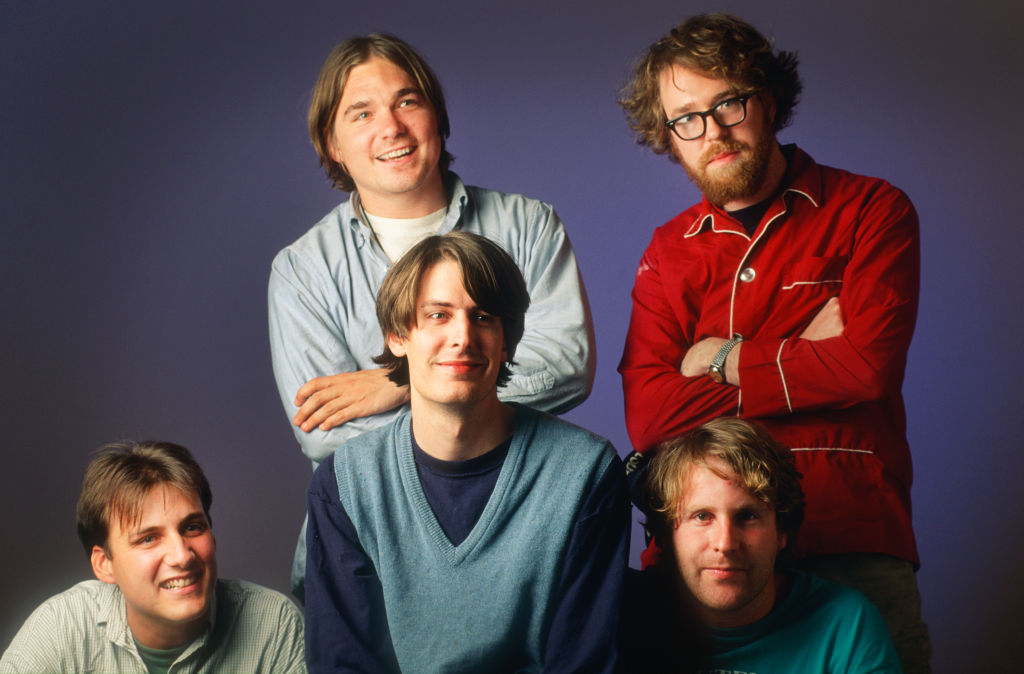
If identification with the object is the basis of rock fandom, it’s easy to see why rock critics have fallen so hard for Pavement. With properly diffuse lighting and a kindly mirror, most (white male) rock critics can probably see themselves as a version of Malkmus, rocking with sensitive ardor and obscure wit. Malkmus was born in Los Angeles, but moved at the age of eight to Stockton, a bald, agricultural northern California town whose only other notable musical contributions have been Chris lsaak and Dave Brubeck (to whom Pavement pay twisted homage on “5-4-Unity” on Crooked Rain), The son of normal, middle-class parents—and not, atypically, the product of a broken home — Malkmus played soccer and tennis in high school, but didn’t fit into any of the established stereotypical cliques (jock, stoner, nerd). “I was just nowhere. I was lost, basically,” he says. “I wish I knew about computers, I should have been a computer nerd. I’d be happier now. But I thought computers were lame because my dad gave me some jock quotient. I was sort of a mix.”
“I’ve got style / Miles and miles/ So much style that it’s wasted” is a line from Watery, Domestic‘s “Frontwards” that’s been thrown back in Malkmus’s face so many times he probably wishes he never wrote it. But it’s no use, really: Pavement reeks of style; Pavement rocks with style. The band’s onstage manner (especially Malkmus’s) has gradually evolved into a kind of preening arrogance that turns on as many as it doubtless turns off—never mind that the arrogance is justified, or that Pavement has once again proven that the enduring lesson of punk rock was that not everyone can do it. With Young gone, only Nastanovich’s goofiness keeps Pavement from turning into a proper rock band.
Crooked Rain plays with this metamorphosis by making rock its subject: Malkmus’s lyrics are some of the most rock-referential since Thurston Moore wrote “Teen Age Riot,” except that Malkmus has a better vocabulary, or maybe just better handwriting. “Goodnight to the rock’n’roll era,” Malkmus sings on the album’s closer, “Fillmore Jive,” but he doesn’t really mean it, man. He name-checks Smashing Pumpkins and Stone Temple Pilots on “Range Life,” and opines that the “music scene is crazy, bands start up each and every day” on the first single (and best song, not coincidentally), “Cut Your Hair.” My theory: all musicians are frustrated rock critics.
“We tried to be rock critics once,” admits Kannberg. “We had a fanzine for a couple hours. It was very frustrating.”
“I don’t really want it to be from the critic’s viewpoint,” says Malkmus, “but more like a fan’s viewpoint. It can come out that way, though, ’cause everyone’s a critic. ‘Range Life’ is supposed to be a person from the ’80s country-rock era, like Lone Justice or Dream Syndicate, not being able to keep up with what’s going on today. It’s not really a dis on those bands, it’s more like ‘I don’t understand this MTV world.’ Like Brian Wilson’s ‘I Just Wasn’t Made for These Times.’”
So why all the rock references, rocker?
“On Slanted and Enchanted,” says Malkmus, “my mom had this little Volkswagen Rabbit, and I would drive around with the rough tapes and sing along with the songs,” replies Malkmus. “Which was fun, but being in New York this time, I couldn’t do that, so I was kind of restricted to making the words up in the studio. Plus being in New York, there was rock music everywhere, where Stockton was, like, no music.
“‘Cut Your Hair’ is just kind of funny. ‘Face right down to the practice room.’ I just got this image of ‘Get down in there and work on it! Five days a week! Just get in there!’” he continues. “It’s just a playful look at different facets of being in a band. I don’t want it to be taken as a scathing cutdown of careerism in music, because, if anything, people should know that, like, Fugazi and Jesus Lizard and Bad Religion probably make more money than Saigon Kick or Britny Fox, and they’re not on major labels. The whole commodity side of music is something that people want to know about but don’t want to know about.”
Like that great line, also from “Cut Your Hair”: “Songs mean a lot, when songs are bought, and so are you.” And so are you.
“Exactly,” says Malkmus. “Pop music is never gonna be pure, and indie rock has this notion of purity in it. Although I think there’s tons of really good things about it that are better than major corporations.”
Which is why you decided to ignore the major-label wolves and remain with Matador, even though you could have just as easily put it out on Matador-Atlantic (though Crooked Rain is being distributed through WEA, Atlantic’s distributor, it will not be a joint release)?
“I just trusted my instincts that our best bet was with Matador,” says Malkmus. “Things were just going well, and it seemed fair to us. Plus Atlantic’s ad copy is disgusting. Who wants to be in an ad with the Lemonheads?”
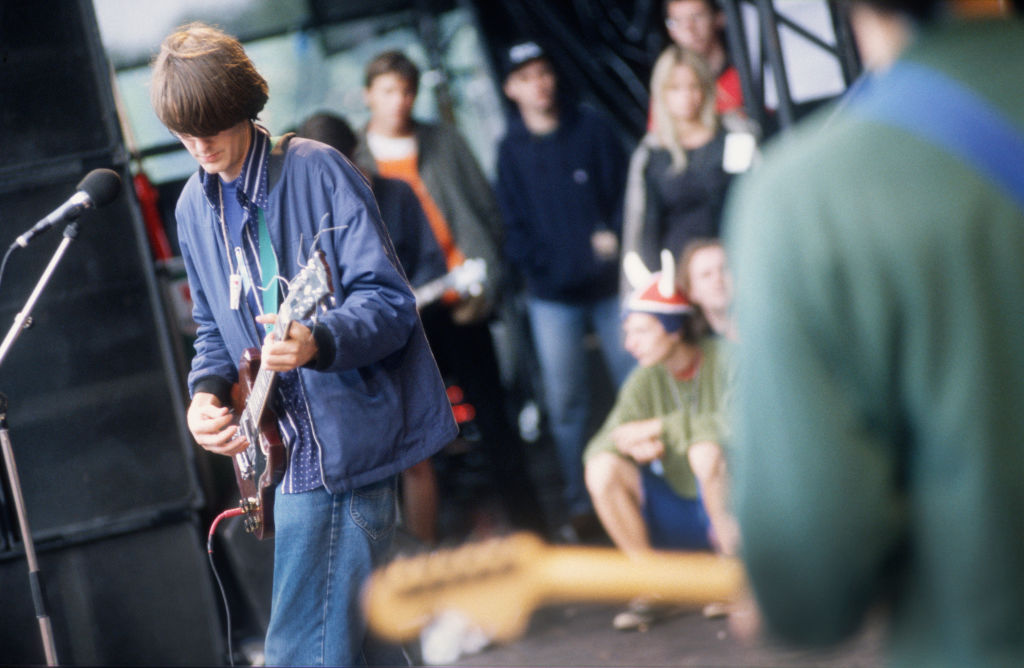
On “Unfair,” the sixth song on Crooked Rain, when Malkmus yells “that’s the slow sick sucking part of me,” you don’t know what he means, but you know what he means. Know what I mean? Pavement’s often impenetrable album and song titles, and Malkmus’s willfully obscure lyrics, signify an ambiguity that’s at the heart of the band’s power.
“I keep my address to myself, because it’s secret,” he sings on “Gold Soundz,” and even when his secrets are nothing more than silly stoner in-jokes, he’s damn careful about how much of himself he’s going to reveal. “Silent Kids,” he tells me, is about “peer pressure and masturbation,” which in fact tells me nothing, but when he says “Stop Breathin’ ” is “about tennis, in a way, like imagining tennis as an emotional battleground,” suddenly the lyrics make perfect sense (“Got struck by the first volley,” heh heh, “Dad they broke me,” hee hee).
To a point, anyway. One effect of the lyrical ambiguity is that several “meanings” can be revealed at once; similarly, the music has to be flexible as well, free of the tyranny of precision. Pavement’s music has always been gloriously fractured, choruses hanging at impossible angles, melodies jutting out from unlikely chord progressions. This “looseness” is often misinterpreted as slacker laissez-faire, but one thing Pavement records are not is haphazard.
“The arrangements are pretty certain,” explains Malkmus. “My cliched melodic sense, like the things I know how to do, they’ll come out naturally. You take enough bong hits, and they’ll come out.
“We want to leave it loose, consciously loose. There’s mistakes on every song that you just let go. They bother me, but I know in five years I’ll like that, it’ll sound good. Let’s say we do make five albums: One of ’em we can do perfect.”
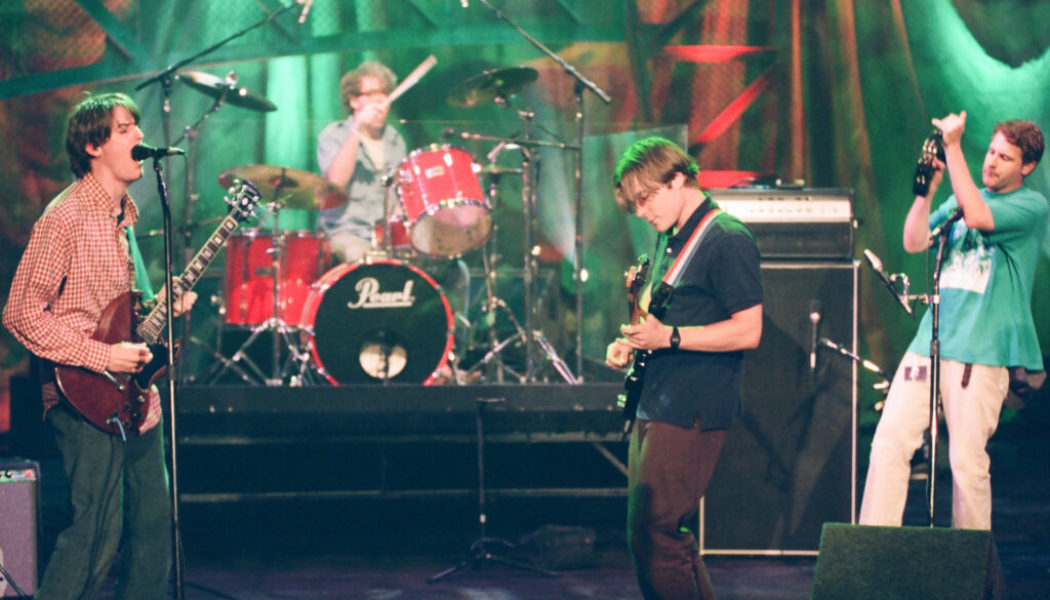




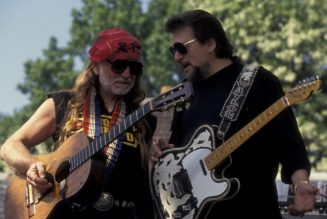
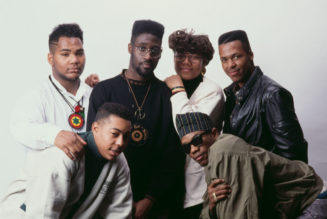
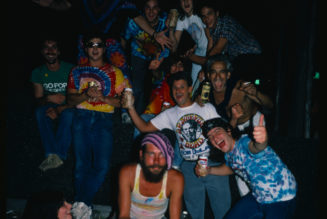



Tagged: 1990s, Archives, jim greer, Pavement, stephen malkmus